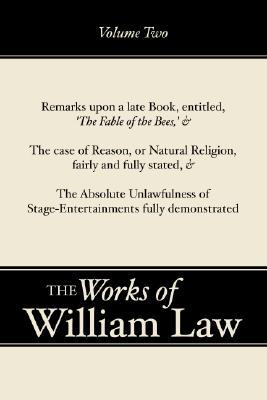- Bible
- Read the Bible
- Bible Versions
- Verse of the Day
- Reading Plans
- Verses by Topic
- Books of the Bible
- Bible Images
- Study
- Commentaries
- Concordances
- Dictionaries
- Encyclopedias
- Sermons
- Bible Atlas & Maps
- BP Wiki
- Devotionals
- Today's Devotionals
- Light of the World
- All Devotionals
- Inspirational Quotes
- More
- Picture Quotes
- Videos
- Inspirational
- Bible Study
- What The Bible Says
- Bible Q&As
- Daily Bread
- Bible by Genre
- Bible Stories
- Random Bible Verse
- Community
- Store
Remarks upon 'The Fable of the Bees'; The Case of Reason; The Absolute Unlawfulness of the Stage-Entertainment, Volume 2
by William Law
The book has no illustrations or index. It may have numerous typos or missing text. However, purchasers can download a free scanned copy of the original rare book from the publisher's website (GeneralBooksClub.com). You can also preview excerpts of the book there. Purchasers are also entitled to a free trial membership in the General Books Club where they can select from more than a million books without charge. Title: The Works of the Reverend William Law, M.a.: Remarks Upon "The Fable of the Bees." the Case of Reason, or Natural Religion, Fairly and Fully Stated. the Absolute Unlawfulness of Stage Entertainments Fully Demonstrated; Volume: 2; Original Publisher: Privately reprinted for G. Moreton; Publication date: 1892; Subjects: Theology; Mysticism; Christian life; Body, Mind
BUY NOW
Paperback, 194 pages
Published March 12th 2001 by Wipf & Stock Publishers (first published January 1st 2001)
© 2025 Bibleportal.com All rights reserved.

William Law was an English cleric and theological writer. He was educated at Emmanuel College, Cambridge, and was elected a fellow in 1711, the year of his ordination. He declined to take the oath of loyalty to King George I, in 1714, and was deprived of his fellowship. He became the tutor of Edward Gibbon, father of the famous historian. Later he returned to his birthplace of King's Cliffe where he lived the rest of his life, though he was known throughout England for his speaking and writing.
His writing of A Serious Call to a Devout and Holy Life (1728), together with its predecessor, A Practical Treatise Upon Christian Perfection (1726), deeply influenced the chief actors in the great Evangelical revival.
John and Charles Wesley, George Whitefield, Henry Venn, Thomas Scott, and Thomas Adam all express their deep obligation to the author. The Serious Call also affected others deeply.
William Law, born inKing's Cliffe, England, in 1686, became a Fellow of Emmanuel College, Cambridge in 1711, but in 1714, at the death of Queen Anne, he became a non-Juror: that is to say, he found himself unable to take the required oath of allegiance to the Hanoverian dynasty (who had replaced the Stuart dynasty) as the lawful rulers of the United Kingdom, and was accordingly ineligible to serve as a university teacher or parish minister.
He became for ten years a private tutor in the family of the historian, Edward Gibbon (who, despite his generally cynical attitude toward all things Christian, invariably wrote of Law with respect and admiration), and then retired to his native King's Cliffe. Forbidden the use of the pulpit and the lecture-hall, he preached through his books. These include - Christian Perfection, the Grounds and Reasons of Christian Regeneration, Spirit of Prayer, the Way to Divine Knowledge, Spirit of Love, and, best-known of all, A Serious Call To a Devout and Holy Life, published in 1728.
Law's most influential work is A Serious Call to a Devout and Holy Life, written in 1728. In this book, he extols the virtue of living a life totally devoted to the glory of God. Although he is considered a high-churchman, his writing influenced many evangelicals, including George Whitefield, John and Charles Wesley, Henry Venn, Thomas Scott, Henry Martyn, and others such as Samuel Johnson. In addition to his writing, Law spent the final years of his life founding schools and almshouses, and in other practical ministries.
William Law died in 1761 just a few days after his last book, An Affectionate Address to the Clergy, went to the printers.
... Show more